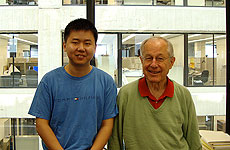Tingjun Yang receives 13th annual URA Thesis Award
 |
| Tingjun Yang, recipient of this year's URA Thesis Award, with advisor Stanley Wojcicki. |
Tingjun Yang will receive this year's University Research Association Thesis Award for his thesis, "A Study of Muon Neutrino to Electron Neutrino Oscillations in the MINOS Experiment." His thesis documents a six-year search for the last unmeasured neutrino-mixing angle at MINOS.
Yang, who was surprised and honored to receive a phone call in early May informing him of the award, credits the support of his collaborators on MINOS as crucial to developing his thesis.
"I really cherished the experience that I had at the MINOS experiment," Yang said. "I am grateful to the many people that I worked with and I want to thank especially my advisor, Stanley Wojcicki."
Yang was nominated for the award by Wojcicki, who was not surprised to learn that Yang would receive this year's prize.
"It is as good a thesis as I have seen in the last 10 years since I started working on MINOS," he said.
Yang's thesis details the measuring of electron-neutrino appearance in the NUMI beam and the search for theta13. Since the MINOS experiment was not designed for this kind of research, Yang and his colleagues developed several new techniques in order to conduct their studies.
The adaptation efforts allowed Yang the opportunity to participate in nearly every aspect of the search process and this range was reflected in his thesis.
"Yang's thesis is quite remarkable for the breadth of material covered," said Steve Brice of the selection panel. "A lot of students take one small aspect of a search and really make it their own. Yang did that, but for seven or eight pieces."
The URA Thesis Award recipient is chosen by a six-person panel representing a range of the laboratory's activities. The recipient, whose Ph.D. thesis work can focus on any aspect of these activities, receives a certificate and $3,500 check.
Since completing his thesis in 2009, Yang has received his Ph.D. from Stanford University and is currently a member of the CDF collaboration and working part-time on research and development of liquid argon time-projection chambers. Yang will receive his prize today at the Fermilab Users' Meeting.
-- Daisy Yuhas
|